Letter from Roger B. Taney to Independent Gist

Attorney Roger Brooke Taney writes to Independent Gist and offers legal counsel about the purchase of land. Transcript included.


Attorney Roger Brooke Taney writes to Independent Gist and offers legal counsel about the purchase of land. Transcript included.
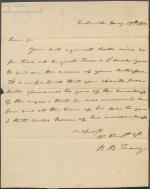
Attorney Roger Brooke Taney writes to Independent Gist and provides legal advice on Gist's suit against Wells regarding the sale of an "unsound" slave. Transcript included.

Maryland Attorney General Roger Brooke Taney writes to attorney Edward Lloyd and discusses his office should be impartial as well as the selection of his deputies.

United States Attorney General Roger Brooke Taney warns that "I may be detained here [at the Supreme Court] until half past 2... I will be at home the moment I can get away from the Court."

Attorney Roger Brooke Taney writes General Walter Jones to discussing the timing of "the monastery case." Taney notes that Jones should "consider the case as continued until June next."

Attorney Roger Brooke Taney writes to Senator Samuel Smith and discuses his thoughts upon treaty making authority and obligations of the President and Congress, referencing France and an act of 1793 as well as Georgia in treaty with Native Am

United States Attorney General Roger Brooke Taney writes to an unknown recipient regarding a ruling in a recent legal case.

Maryland State Senator and attorney Roger Brooke Taney writes to an unknown recipient with instructions regarding deeds for land in Maryland.

Attorney General Roger Brooke Taney writes to the Secretary of the Navy [Levi Woodbury] regarding "an act to extend the pension heretofore granted to the widows of persons killed or who died in the naval service."

Maryland Attorney General Roger Brooke Taney writes interpretation of the will of A. Riddle of London. "Mr.
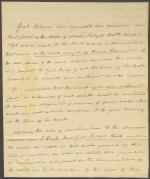
Maryland Attorney General Roger Brooke Taney's writes this interpretation of Charles Ridgely' will in regard to the "land bought of Henry Darnall." Taney provides his opinion on this matter at the request of General Ridgely, who had inherited the

Supreme Court Chief Justice Roger Brooke Taney writes to Joel Barlow Sutherland and discusses the legal distinction between letters being "in the mail" and "in the post office." Taney notes that he cannot conduct further research on the question d

Attorney Roger Brooke Taney asks for information about legal decisions in Maryland regarding selling property "conveyed in trust to secure the repayment of money loaned." Taney also request a copy of the relevant decision by the court of appeals o
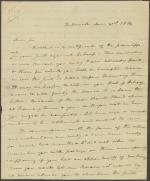
Attorney Roger Brooke Taney writes to Clotworthy Birnie and discusses the suit against Dehoof as well as the resulting legal costs.

Attorney Roger Brooke Taney informs his client, Mrs. Patterson, that she has been served with a legal notice. When Mrs.
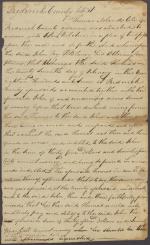
Three legal documents, including an arrest warrant for Thomas Noland, regarding the case of John Ritchie v. Thomas Noland for an unpaid debt. Roger Brooke Taney serves as John Ritchie's attorney.

Chief Justice of the Supreme Court Roger Brooke Taney writes to his wife, Anne Key Taney, and informs her of his safe arrival in Washington, DC.

Baltimore attorney Roger Brooke Taney writes J. J. Speed, an attorney in Annapolis, and discusses a particular legal case. "The postponement of the case of Canals vs. McFadon is perfectly agreeable to me," as Taney explains.

Supreme Court Chief Justice Roger Brooke Taney writes to J. Mason Campbell, an attorney, about a political and legal matter related to Maryland's constitution.

Supreme Court Chief Justice Roger Brooke Taney writes J. Mason Campbell to defend a decision he made as Acting Secretary of War (June - August 1831) during President Andrew Jackson's administration.

Supreme Court Chief Justice Roger Brooke Taney writes to Associate Justice Samuel Nelson about various court and other legal matters.

Attorney Roger Brooke Taney writes to his client, a Mr. Colt, and offers advice on the best way to influence the federal government.

Supreme Court Chief Justice Roger Brooke Taney responds to Garret Dorset Wall's recommendation of former New Jersey Governor Peter Dumont Vroom for the vacancy at the United States Supreme Court.
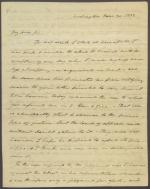
United States Attorney General Roger Brooke Taney writes to an unknown recipient, possibly a colleague, and analyzing the case against Mrs. Davison regarding a bond and debt. Taney predicts the Court of Appeals will follow the ruling of "2 Har.
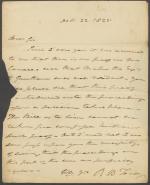
Attorney Roger Brooke Taney to another lawyer, J. J. Speed, about proving a certain point in a particular legal case. "Please see that this proof [is] introduced into the proceedings before a decision takes place," as Taney explains.